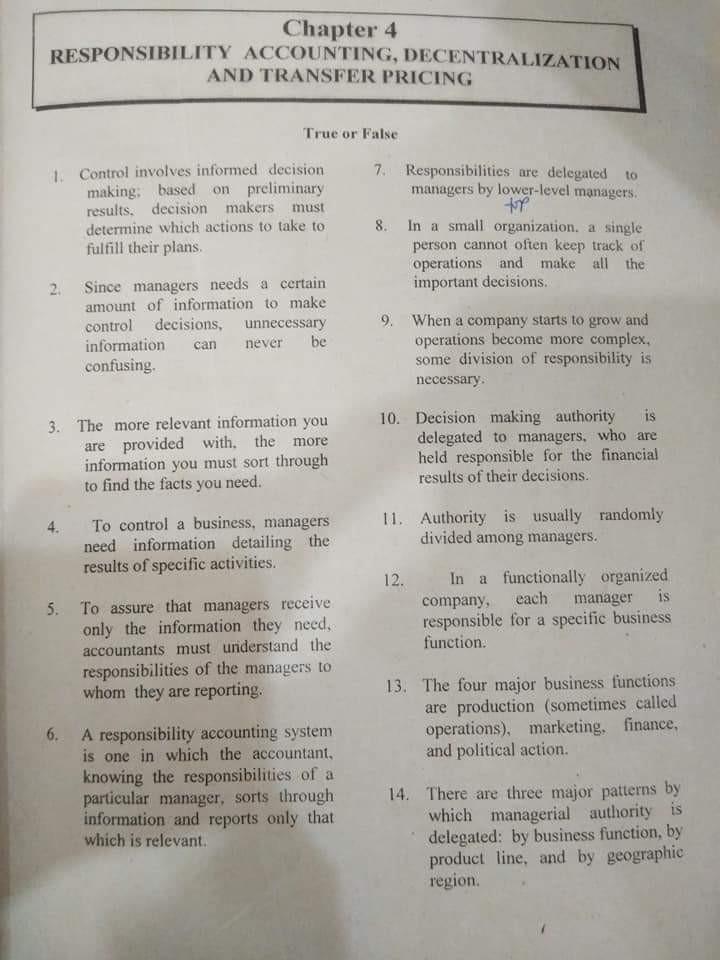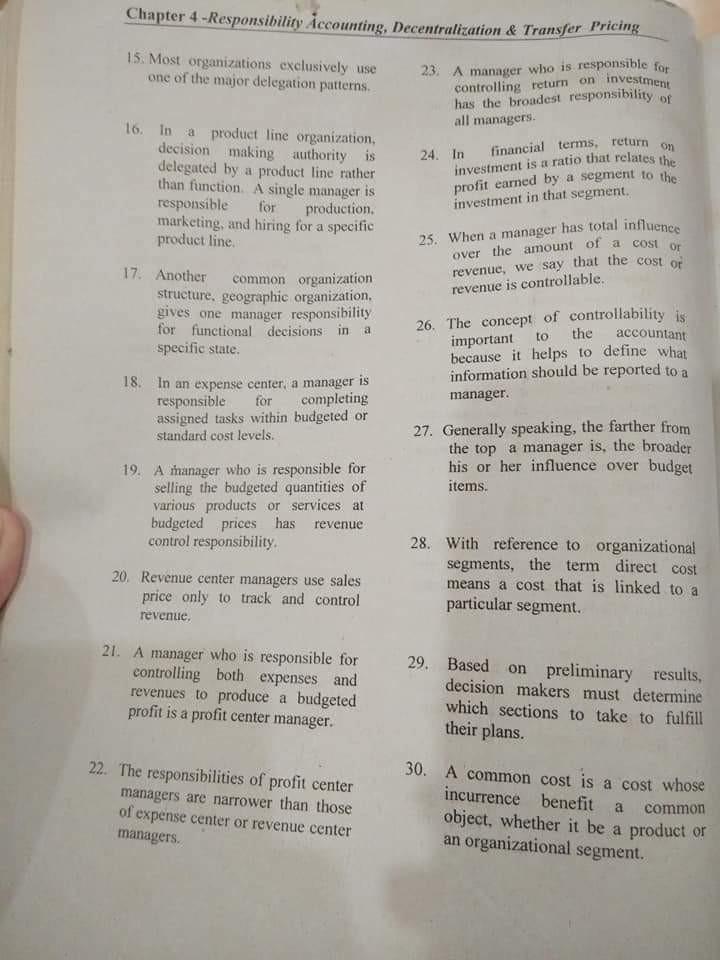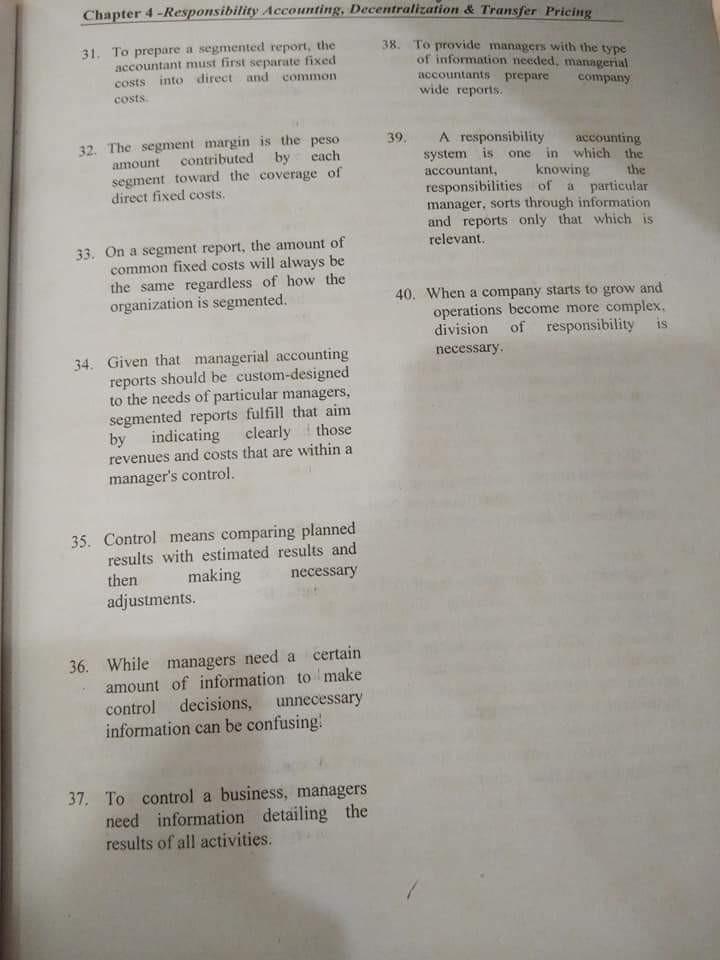Answered step by step
Verified Expert Solution
Question
1 Approved Answer
Chapter 4 RESPONSIBILITY ACCOUNTING, DECENTRALIZATION AND TRANSFER PRICING True or False 1. Control involves informed decision 7. Responsibilities are delegated to making, based on preliminary



Chapter 4 RESPONSIBILITY ACCOUNTING, DECENTRALIZATION AND TRANSFER PRICING True or False 1. Control involves informed decision 7. Responsibilities are delegated to making, based on preliminary managers by lower-level managers. results. decision makers must top determine which actions to take to 8. In a small organization, a single fulfill their plans person cannot often keep track of operations and make all the 2 Since managers needs a certain important decisions. amount of information to make control decisions, unnecessary 9. When a company starts to grow and information never be operations become more complex, confusing some division of responsibility is necessary can 3. The more relevant information you are provided with, the more information you must sort through to find the facts you need. 10. Decision making authority is delegated managers, who are held responsible for the financial results of their decisions. 4. To control a business, managers need information detailing the results of specific activities. 11. Authority is usually randomly divided among managers. 12. In a functionally organized company, each manager is responsible for a specific business function 5. To assure that managers receive only the information they need, accountants must understand the responsibilities of the managers to whom they are reporting. 6. A responsibility accounting system is one in which the accountant, knowing the responsibilities of a particular manager, sorts through information and reports only that which is relevant. 13. The four major business functions are production (sometimes called operations), marketing, finance, and political action. 14. There are three major patterns by which managerial authority is delegated: by business function, by product line, and by geographic region. controlling return on investment investment is a ratio that relates the profit earned by a segment to the 25. When a manager has total influence revenue, we say that the cost or Chapter 4 - Responsibility Accounting, Decentralization & Transfer Pricing 15. Most organizations exclusively use one of the major delegation patterns. 23. A manager who is responsible for has the broadest responsibility of all managers. 16. In a product line organization, decision making authority is financial terms, return on delegated by a product line rather than function. A single manager is. responsible for production marketing, and hiring for a specific product line 24. In investment in that segment. Cost Of over the amount of a revenue is controllable. 17. Another common organization structure, geographic organization. gives one manager responsibility for functional decisions in a specific state. to accountant 26. The concept of controllability is important the because it helps to define what information should be reported to a manager. 18. In an expense center, a manager is responsible for completing assigned tasks within budgeted or standard cost levels. 27. Generally speaking, the farther from the top a manager is, the broader his or her influence over budget items. 19. A manager who is responsible for selling the budgeted quantities of various products or services at budgeted prices has revenue control responsibility 20. Revenue center managers use sales price only to track and control revenue. 28. With reference to organizational segments, the term direct cost means a cost that is linked to a particular segment. 21. A manager who is responsible for controlling both expenses and revenues to produce a budgeted profit is a profit center manager. 29. Based on preliminary results, decision makers must determine which sections to take to fulfill their plans. 22. The responsibilities of profit center managers are narrower than those of expense center or revenue center managers 30. A common cost is a cost whose incurrence benefit a common object, whether it be a product or an organizational segment. Chapter 4 - Responsibility Accounting, Decentralization & Transfer Pricing 31. To prepare a segmented report, the accountant must first separute fixed costs into direct and common costs 38. To provide managers with the type of information needed, managerial accountants prepare company wide reports. 39, 32. The segment margin is the peso amount contributed by each segment toward the coverage of direct fixed costs A responsibility accounting system is one in which the accountant, knowing the responsibilities of 3 particular manager, sorts through information and reports only that which is relevant. 33. On a segment report, the amount of common fixed costs will always be the same regardless of how the organization is segmented. 40. When a company starts to grow and operations become more complex, division of responsibility necessary IS 34. Given that managerial accounting reports should be custom-designed to the needs of particular managers, segmented reports fulfill that aim by indicating clearly those revenues and costs that are within a manager's control. 35. Control means comparing planned results with estimated results and then making necessary adjustments. 36. While managers need a certain amount of information to make control decisions, unnecessary information can be confusing! 37. To control a business, managers need information detailing the results of all activities
Step by Step Solution
There are 3 Steps involved in it
Step: 1

Get Instant Access to Expert-Tailored Solutions
See step-by-step solutions with expert insights and AI powered tools for academic success
Step: 2

Step: 3

Ace Your Homework with AI
Get the answers you need in no time with our AI-driven, step-by-step assistance
Get Started


